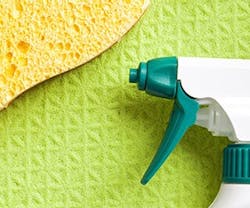Tips for Creating a Balanced Restroom Cleaning Program
With World Environment Day quickly approaching, now is the perfect time for cleaning professionals to think about implementing a green cleaning program or review green products currently in use.
Don’t know where to start? Clorox Professional Products Company shares a few key tips:
1. Green your cleaning routine with naturally derived products when you can. Experts recommend that facilities choose green cleaners that are certified by third-parties such as Green Seal and the U.S. Environmental Protection Agency’s (EPA) Design for the Environment (DfE). The Green Seal certification is awarded to products that have less impact on the environment and work well. DfE recognition means that the product uses the safest possible ingredients and performs well.
2. When choosing green products look for:
- Efficacy. Will the products do the job you need them to do effectively?
- Certification. Are the products certified by respected third-party agencies, such as Green Seal or DfE?
- Disclosure of ingredients. Do the products provide a full list of their ingredients on the label or the manufacturer’s website?
3. Disinfect when you must. While green alternatives are now available for most cleaning products, disinfectants remain an essential part of ensuring a healthy restroom. Public restrooms are filled with high-touch surfaces and objects that can harbor germs, so cleaning professionals should select products specifically formulated and EPA-registered to kill illness-causing bacteria on these surfaces.
- Cleaning professionals can help prevent cross-contamination in restrooms by focusing on these surfaces and objects such as counter tops, urinals, toilets, door knobs, toilet handles, stall locks, and faucets.
- Always refer to the product label and follow the manufacturer’s instructions for use and contact time, or the length of time the disinfectant needs to remain wet on the surface to properly kill viruses, fungi, and bacteria.
4. When choosing disinfectants look for:
- Efficacy. Is the product EPA-registered to kill the pathogens of most concern (i.e., influenza, norovirus, MRSA, etc.)?
- Fast contact times. Will the products kill harmful bacteria and viruses quickly?
